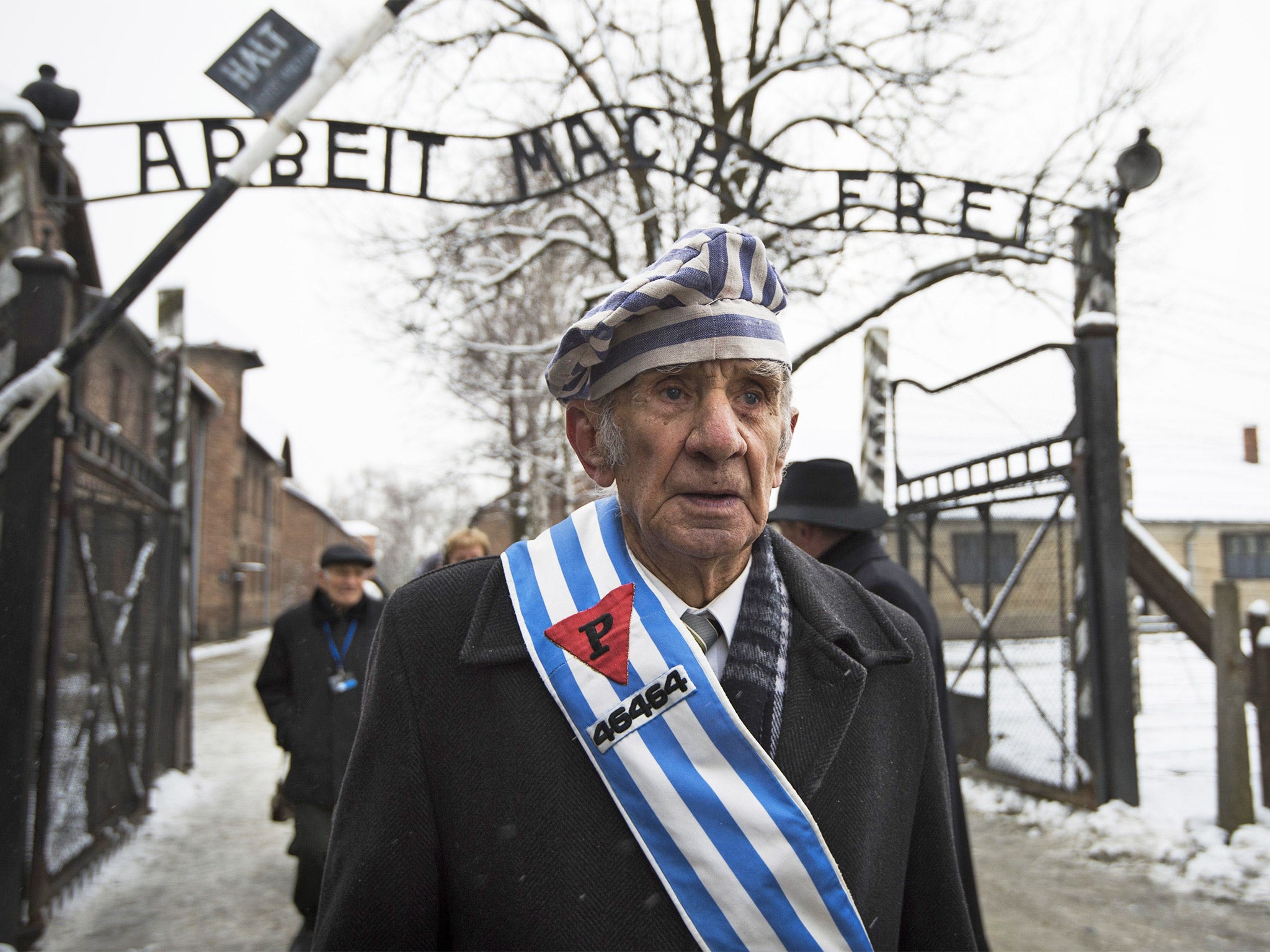Auschwitz liberation 70th anniversary: Nazi victims remembered as spectre of prejudice reappears
Paris attacks cast shadow on memorial

As night fell, 300 Holocaust survivors gathered at the “Death Gate” of Auschwitz-Birkenau in Poland to remember more than a million murdered souls of the camp – and warned of anti-Semitism again spreading across Europe on the 70th anniversary of the camp’s liberation.
Ronald Lauder, president of the World Jewish Congress, told gathered leaders, among them France’s President François Hollande, that Europe today “looks more like 1933 than 2015”.
The Jewish leader was speaking inside a huge tent, encompassing the infamous gates to the camp themselves, which sheltered survivors, family members, children and world leaders from the falling snow and temperatures outside. Through the centre of the tent ran the tracks of the railway which once delivered 1.1 million people to their deaths.
It was one of many events around the world to mark Holocaust Memorial Day. In Berlin, the German President Joachim Gauck told the Bundestag: “The memory of the Holocaust remains a matter for all citizens living in Germany. We all have a responsibility as to which way our country goes.”
In Paris, François Hollande laid a wreath at the Mémorial de la Shoah. Speaking less than three weeks after four people were shot dead at a Kosher supermarket during the Charlie Hebdo attacks, he urged France’s Jewish population not to feel they had to leave. “Your place is here,” he said. “At your home.”
In London, Prince Charles, joined David Cameron, Ed Miliband, Nick Clegg and about a thousand others, including Holocaust survivors, at a memorial service in the Methodist Central Hall, Westminster.
Among those due to perform at the service was the cellist, singer and conductor Simon Wallfisch, grandson of Anita Lasker-Wallfisch, 89, a surviving member of the women’s orchestra in Auschwitz.
The Government had earlier promised to contribute £50m towards a new Holocaust memorial and education centre in London recommended by the cross-party commission established to consider how awareness of the Holocaust can be maintained after the final witnesses die.
Thousands of people all over the UK attended more than 2,400 events commemorating the Holocaust.
Auschwitz-Birkenau was unique among the Nazi camps. Never intended for a single purpose, the camp evolved until its liberation by the Red Army on 27 January 1945.
The Russian President Vladimir Putin stayed away from the commemorations, however, in what was interpreted as a sign of tensions with the West over the conflict in Ukraine. Instead he attended a ceremony at the Jewish Museum and Tolerance Centre in Moscow.
Holocaust Memorial Day 2015: Haunting images of Auschwitz
Show all 20“I was going to make a very different speech today. But after the recent events in Paris, throughout Europe and around the world, I cannot ignore what is happening today,” Mr Lauder said.
“For a time, we thought that the hatred of Jews had finally been eradicated. But slowly the demonisation of Jews started to come back. First in articles and on the internet, in some religious schools and even universities. From there it made its way into mainstream society.”
The Jewish leader’s warning was echoed by the words of survivors themselves.
Roman Kent, 86, who was liberated in Flossenbürg in 1945 after being imprisoned in Auschwitz, Gross-Rosen and other concentration camps, said: “We do not want our past to be our children’s future,” his voice breaking as he repeated the words to applause.
Noah Klieger, 89, a survivor on his 151st visit to the camp, tried to say why he kept coming: “You cannot explain it, but you can tell it. That is what we must do now.”
Another survivor, Susan Pollack, who as a 14-year-old child lied about her age to escape the gas chambers, told The Independent: “It is hard to talk about it, but it is much harder to keep silent.”
Additional reporting by Adam Lusher
Subscribe to Independent Premium to bookmark this article
Want to bookmark your favourite articles and stories to read or reference later? Start your Independent Premium subscription today.

Join our commenting forum
Join thought-provoking conversations, follow other Independent readers and see their replies